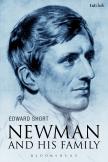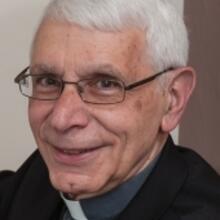Heart to Heart
The achievements of John Henry Newman are staggering. He did nothing less than craft a language that enabled many 19th-century men and women to affirm the awe-inspiring mystery of God in not merely a conventional notional manner, but with a real apprehension that influenced and changed their lives (to use a distinction that permeates his work).
Moreover, he did so in a rich variety of genres: sermons and essays, novels and plays, poems and prayers as well as his matchless treatises. His genius was far-ranging—as was his correspondence. One marvels that Newman, whose literary production issued not from the solitude of the cloister, but from active engagement in education, preaching, pastoral ministry and establishing the community of the Oratory in England, could ever find time to compose some of the finest letters in English literature.
Yet volume after volume of these letters have been carefully edited and published, revealing the mind and heart of this extraordinary figure. Nor, of course, are we speaking of a limited-character “tweet” but of a substantive, often musically modulated outpouring of insight, whimsy, polemic, grief and sometimes heartfelt self-revelation. All these qualities appear in the letters he exchanged over 70 years with members of his family. It is the merit of Edward Short’s generous volume to give us access to these, and so much more. Newman’s cardinalatial motto was “Cor ad cor loquitur”—“heart speaks to heart.” As Short remarks, “never did he practice it more lovingly than within his own fractious family.”
John Henry Newman was the eldest of six: three brothers and three sisters. Their shared intimacy was profound—which made their subsequent divisions all the more painful. Short devotes a chapter to Newman’s father and mother, and one to each of the siblings. He adds another, crucially important chapter, on Newman’s correspondence with his nephew, John Rickards Mozley, eldest son of his sister Jemima. For the most part, the chapters draw from the letters exchanged between Newman and the person in question. But Short, the author of a fine volume titled Newman and His Contemporaries, also provides ample excurses on other writings of Newman, as well as representative figures of Victorian England.
I can only hint at some of the riches of the present work. Though all the figures of this intriguing family deserve close attention, two perhaps exercised, in different ways, a particular influence upon the development of Newman’s character and vision. The business failures and disappointments of his father and the sudden death of his beloved sister Mary at age 19 left indelible marks upon him. Short summarizes: “If the lesson of his father’s life had been to renounce worldly success, the lesson of Mary’s death was to see mortal attachments as intimations of immortal tidings to come.” These words bring to mind Newman’s most famous poem, “The Pillar of Cloud,” which begins, “Lead, kindly Light.” The poem concludes with his own intimation of time-transcend- ing immortality, which Mary’s untimely death had but heightened: “And with the morn those angel faces smile/ Which I have loved long since, and lost awhile.”
The lengthy correspondence with the other siblings, Charles and Frank, Harriet and Jemima, by turns affectionate and argumentative, sets in bold relief, within the narrow focus of family, the two defining issues of Newman’s life and illustrates the cost they exacted. The sisters embody the Anglican establishment’s horror of all things “Romish”; they never became reconciled to John’s conversion. The brothers represent, each in his own fashion, the 19th century’s growing moralistic relativism and skepticism regarding religious truth claims and the normativity of revelation.
This latter attitude Newman famously characterized in his “Biglietto Address” (on the occasion of being made a cardinal) as “the spirit of liberalism in religion.” He understood by this the reduction of religion to an individualistic morality and private sentiment with no demonstrable basis in objective truth. Against this increasingly prevalent view, Newman had set himself from his early days. And nowhere was he more engaged in this struggle, charitably but insistently, than with his own brothers.
The chapter devoted to Newman’s relationship and correspondence with his nephew, John Rickards Mozley, sums up the tension between Victorian society’s fading religious inheritance and its growing materialism and rationalism. The outcome, in Newman’s eyes, was to dull the “pied beauty,” to flatten the multidimensional nature of reality. His counterstrategy was not a retreat from the world, but an untiring effort to articulate and evoke a sacramental vision: a vivid sense of “real presences.” For Newman all hints and intimations find their fulfillment in Christ’s eucharistic presence. And, though he may not have succeeded with his brothers or nephew, many, like the Jesuit priest and poet Gerard Manley Hopkins, drew enduring inspiration from Newman’s vision and witness.
Edward Short’s superb knowledge of 19th century English literature and history illumines his presentation. At times this very knowledge and the enthusiasm it engenders lead him to take leisurely strolls down fascinating bypaths. But eventually the reader is guided back to the main road, and the interrupted discussion is taken up again, now enriched.
Of all the members of the family, undoubtedly the one closest to Newman’s heart was his mother, Jemima Fourdrinier, of Huguenot heritage. Short writes: “Newman had a deep bond with his mother—one forged in heartbreak and loss, as well as love and affection—and it showed him not only the vanity of human wishes but the wisdom of empathy.” That “empathy” is apparent in the letters Newman exchanged, not only with family, but with countless men and women over the course of his long and fruitful life. Empathy also marks Edward Short’s wise study.
This article also appeared in print, under the headline “Heart to Heart,” in the April 21, 2014, issue.








